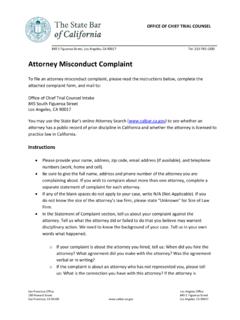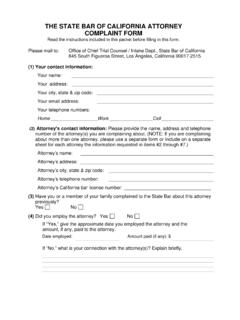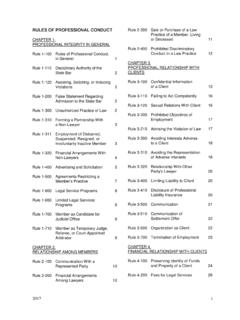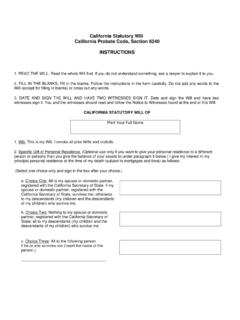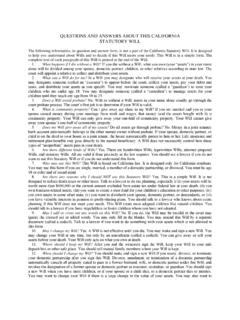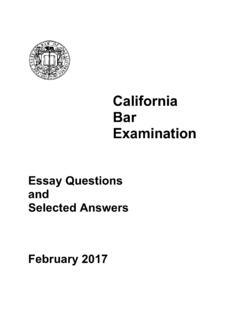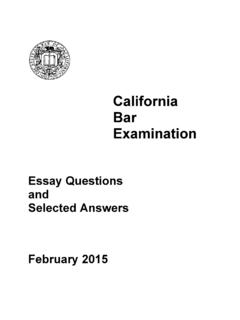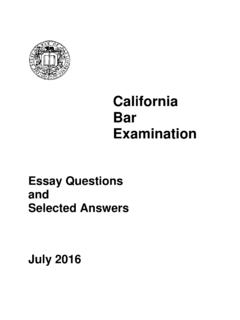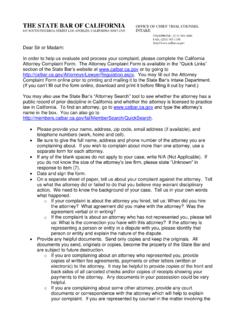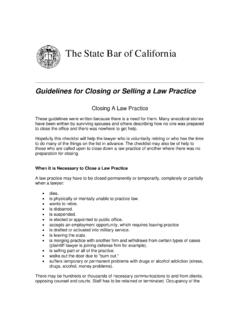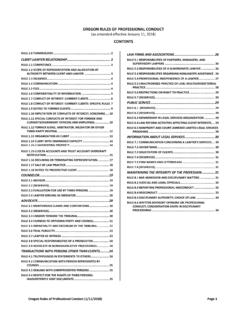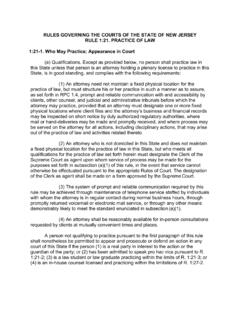Transcription of Rule 4.3 Communicating with an Unrepresented Person* …
1 1 Rule Communicating with an Unrepresented Person* (Rule approved by the Supreme Court, Effective November 1, 2018) (a) In Communicating on behalf of a client with a person* who is not represented by counsel, a lawyer shall not state or imply that the lawyer is disinterested. When the lawyer knows* or reasonably should know* that the Unrepresented person* incorrectly believes* the lawyer is disinterested in the matter, the lawyer shall make reasonable* efforts to correct the misunderstanding. If the lawyer knows* or reasonably should know* that the interests of the Unrepresented person* are in conflict with the interests of the client, the lawyer shall not give legal advice to that person,* except that the lawyer may, but is not required to, advise the person* to secure counsel.
2 (b) In Communicating on behalf of a client with a person* who is not represented by counsel, a lawyer shall not seek to obtain privileged or other confidential information the lawyer knows* or reasonably should know* the person* may not reveal without violating a duty to another or which the lawyer is not otherwise entitled to receive. Comment [1] This rule is intended to protect Unrepresented persons,* whatever their interests, from being misled when Communicating with a lawyer who is acting for a client. [2] Paragraph (a) distinguishes between situations in which a lawyer knows* or reasonably should know* that the interests of an Unrepresented person* are in conflict with the interests of the lawyer s client and situations in which the lawyer does not.
3 In the former situation, the possibility that the lawyer will compromise the Unrepresented person s* interests is so great that the rule prohibits the giving of any legal advice, apart from the advice to obtain counsel. A lawyer does not give legal advice merely by stating a legal position on behalf of the lawyer s client. This rule does not prohibit a lawyer from negotiating the terms of a transaction or settling a dispute with an Unrepresented person.* So long as the lawyer discloses that the lawyer represents an adverse party and not the person,* the lawyer may inform the person* of the terms on which the lawyer s client will enter into the agreement or settle the matter, prepare documents that require the person s* signature, and explain the lawyer s own view of the meaning of the document and the underlying legal obligations.
4 [3] Regarding a lawyer s involvement in lawful covert activity in the investigation of violations of law, see rule , Comment [5]. 1 NEW RULE OF PROFESSIONAL CONDUCT (No Former Rule) Communicating with an Unrepresented Person EXECUTIVE SUMMARY In connection with the consideration of current rule 2-100 (Communication with a Represented Party), the Commission for the Revision of the rules of Professional Conduct ( Commission ) reviewed and evaluated ABA Model Rule (Dealing with an Unrepresented Person), the Restatement of the Law of Lawyering, section 103 (Communications with Unrepresented Nonclient).
5 The Commission also reviewed relevant California statutes, rules , and case law relating to issues addressed by the proposed rule. Although the proposed rule has no direct counterpart in the current California rules , much of its concept is found in current rule 3-600(D) concerning how a lawyer for an organization must deal with the organization s constituents. The result of the evaluation is proposed rule ( Communicating with an Unrepresented Person). Rule As Issued For 90-day Public Comment The key concept of the proposed rule is contained in paragraph (a), which requires a lawyer who is Communicating on behalf of a client with an Unrepresented person, to do three things when applicable: (i) not state or imply that the lawyer is disinterested; (ii) correct the person s misconception if the lawyer knows or reasonably should know the person incorrectly believes the lawyer is disinterested.
6 And (iii) not provide legal advice, other than to obtain counsel, if the interests of the person are in conflict with the client s interests. By including the first two requirements, the proposed rule will extend the principles found in current rule 3-600(D) beyond the organizational Commission concluded the provision provides important public protection and guidance to lawyers interacting with Unrepresented persons by clarifying the lawyer s duties in Communicating with a represented person rather than requiring lawyers to parse and interpret more general prohibitions in the State Bar Act.
7 Further, proposed rule complements proposed rule s prohibitions on Communicating with a represented party when such communications are permitted under that rule. Moreover, rule would provide an alternative basis for discipline to Business & Professions Code 6068(a) and 6106 that would not require the establishment of a fiduciary relationship or proof of an act of moral turpitude. Finally, a version of Model Rule has been adopted in every other jurisdiction in the country. The major concern that was raised with respect to paragraph (a) is the third prohibition concerning the giving of legal advice.
8 It was suggested that unless the Unrepresented person retains counsel, the lawyer will be unreasonably restricted in attempting to inform the person of the lawyer s client s legal positions. There is a fine line between providing legal advice and giving legal information and a lawyer arguably should not be subject to discipline for giving legal advice 1 Rule 3-600(D) provides: (D) In dealing with an organization's directors, officers, employees, members, shareholders, or other constituents, a member shall explain the identity of the client for whom the member acts, whenever it is or becomes apparent that the organization's interests are or may become adverse to those of the constituent(s) with whom the member is dealing.
9 The member shall not mislead such a constituent into believing that the constituent may communicate confidential information to the member in a way that will not be used in the organization's interest if that is or becomes adverse to the constituent. 2or stating the legal positions of the lawyer s client. The Commission has addressed this concern by including proposed Comment [2], discussed below. Paragraph (b) has no counterpart in jurisdictions that have adopted Model Rule Nevertheless, the Commission has added the provision to protect the attorney-client privilege and legal rights of third persons with whom the lawyer interacts.
10 A concern expressed regarding paragraph (b) is that it imposes unique risks on a lawyer and creates a gap between what a client may do and what a lawyer is permitted to do. The Commission, however, concluded that a lawyer should not be permitted to engage in conduct that is prejudicial to the administration of justice simply because a layperson might not have the same duties as a lawyer. There are three comments to the rule. Comment [1] states the policy underlying the rule and its intent, and so explains how the rule should be applied to a contemplated course of conduct, an approved function of a rule comment.
